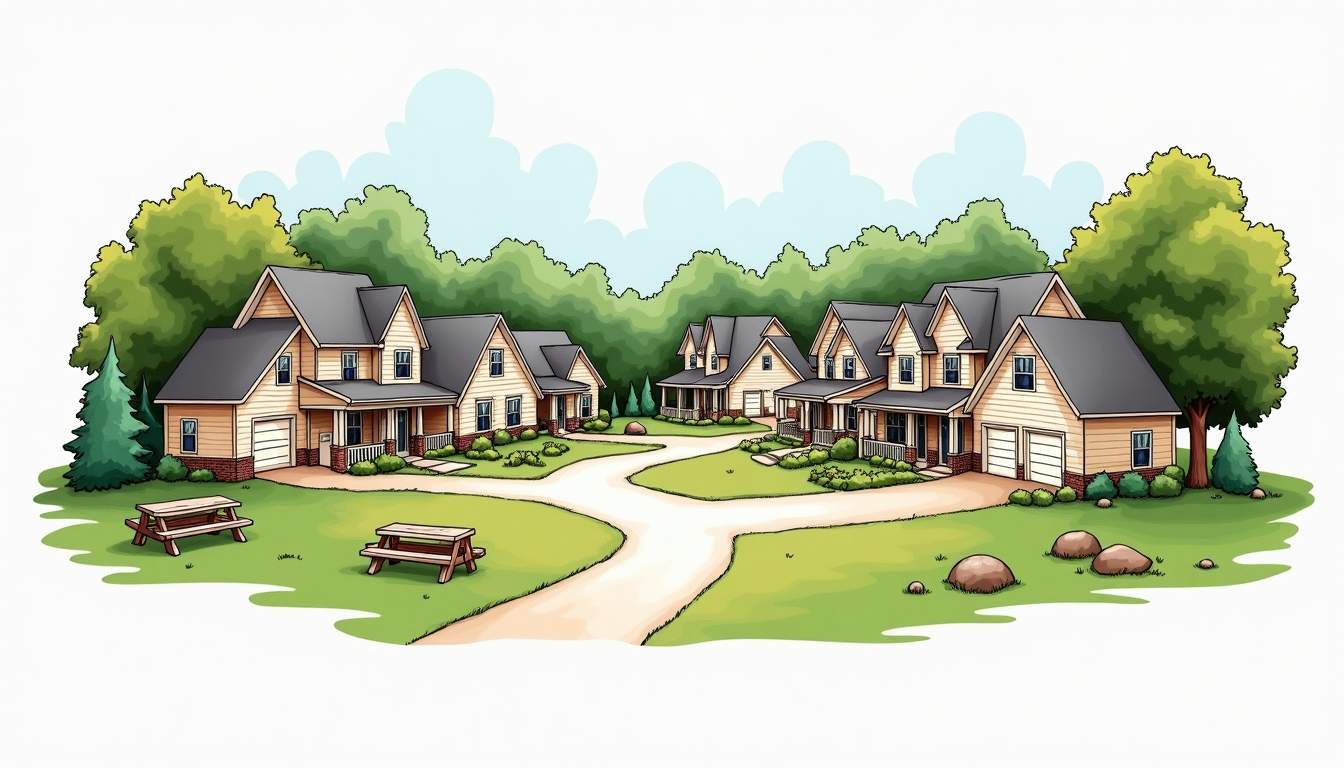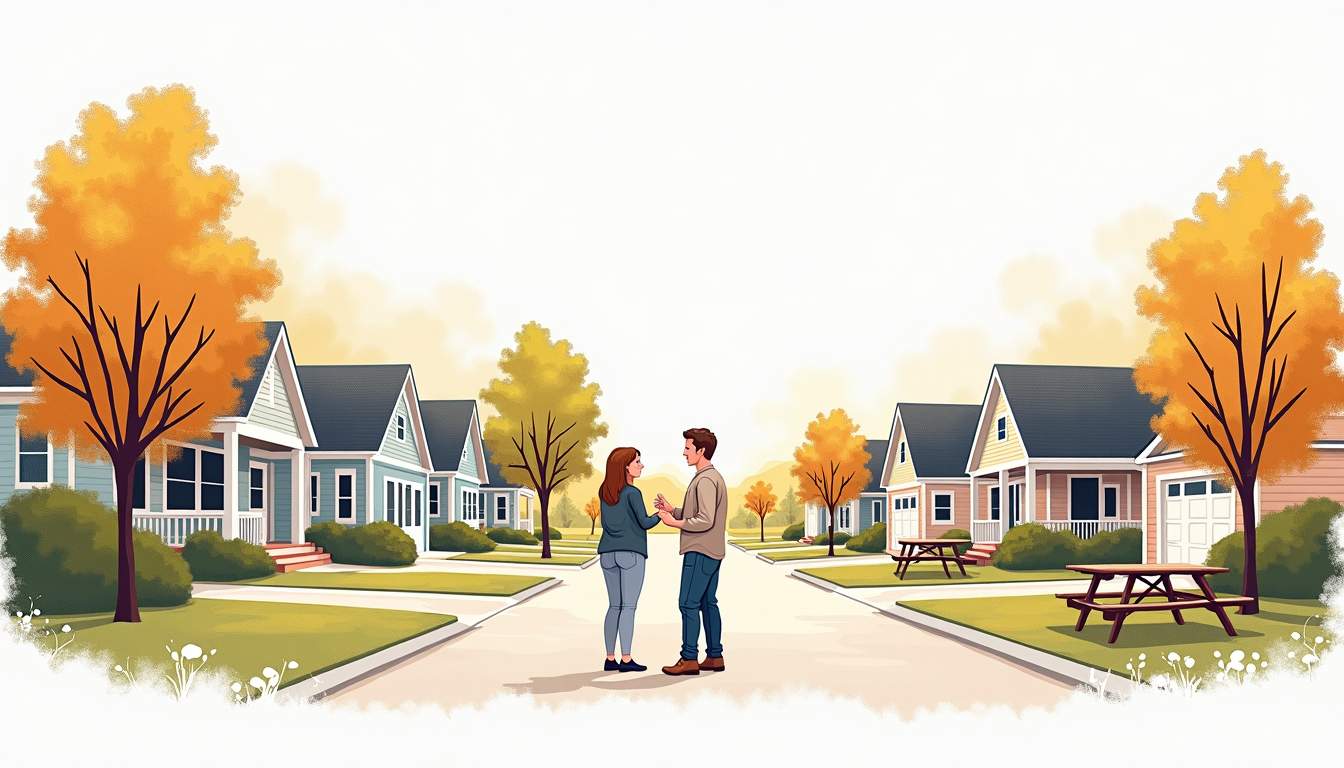
Tennessee balances Southern charm, scenic variety and vibrant community life, making it a popular choice for homebuyers seeking neighborhoods with strong social programs and amenities. From lakeside retirement villages to active urban developments, the state offers a range of communities designed to foster connection, recreation and convenience.
Communities that emphasize social activities create built-in opportunities to meet neighbors, learn new hobbies and maintain an active lifestyle. For many residents, these social structures reduce isolation, improve mental and physical health, and make daily life more engaging.
In Tennessee, climate and geography make outdoor socializing possible for much of the year. Mild winters and long summers support community gardens, walking clubs and outdoor concerts. The state’s cultural roots in music, crafts and food also feed into regular social programming.
Different neighborhoods serve different groups—young families, empty nesters, retirees or mixed-age residents. Active adult communities often provide age-restricted amenities and calendars built around social clubs, educational talks and group fitness. Mixed-age developments may emphasize school-related events, parks and community service projects.
Social amenities usually include a clubhouse, multipurpose rooms, fitness centers, pools, walking trails and organized clubs. Additional offerings might include arts studios, performance spaces, on-site dining, shuttle services to local attractions and dedicated activity coordinators to plan events.
Across Tennessee, several developments stand out for curated social life and amenity-rich living. These range from planned retirement communities to multi-generational neighborhoods near urban centers. The communities below are examples of different approaches to social living in the state.
Retirement-focused neighborhoods provide consistent weekly programming: card games, book clubs, gardeners groups, walking clubs and lectures. Many include wellness programs that incorporate both fitness classes and social outings to local cultural events or shopping districts.
Examples often include lakeside settings near major water bodies such as Old Hickory Lake or Reelfoot Lake, where boating clubs and fishing groups become social hubs. Indoor amenities complement outdoor access with community rooms for crafts, technology classes and performance nights.
Golf communities in Tennessee frequently double as social hubs. Beyond golf leagues, residents often find bridge groups, wine tastings, culinary classes and live music nights. Clubhouses typically host holiday parties, small business networking events and member-led groups focused on hobbies like photography or woodworking.
Developments near Nashville, Knoxville and Chattanooga combine urban cultural access with neighborhood programming. These areas often offer robust calendars because they draw on nearby universities, arts organizations and local businesses to host speakers, concerts and volunteer projects.
The Nashville metropolitan area blends small-town neighborliness with metropolitan amenities. Communities here capitalize on live music, food culture and strong arts scenes to create varied social calendars.
Neighborhoods close to downtown and midtown host regular live performances, open mic nights and collaborative events with local venues. Community centers may organize songwriters’ nights, songwriting workshops and music appreciation groups that tap into Nashville’s musical heritage.
Seasonal festivals and farmers markets serve as natural gathering points where residents can volunteer, join vendor committees, or participate in talent shows and cooking contests.
Transit-accessible communities often have walkable town centers where restaurants and shops host social mixers, trivia nights and art walks. This walkability encourages spontaneous interactions and makes community events accessible without driving.
Chattanooga blends outdoor recreation with an evolving arts scene. Riverfront developments, mountain-adjacent neighborhoods and adaptive-reuse districts offer rich social options for residents who enjoy both nature and culture.
Hiking clubs, river paddling groups and cycling teams are common. Community calendars frequently include group outings to Lookout Mountain, coordinated cleanups, climbing clinics and nature talks with local environmental organizations.
Neighborhood organizers often partner with regional outfitters to offer discounted group trips and skill-based clinics, which help newcomers join in without needing their own specialized gear right away.
Industrial loft conversions and gallery districts create spaces for makers’ markets, studio nights and craft workshops. These communities foster social interaction through shared studio space, pop-up shops and collaborative public art projects.
East Tennessee offers a mix of university energy and mountain living. Knoxville neighborhoods benefit from college-affiliated cultural events, while mountain communities leverage seasonal festivals and outdoor sports to generate social life.

Continuing education classes, guest-lecture series and community college partnerships are common in areas near universities. These programs provide both intellectual engagement and a social setting for meeting people with shared interests.
Mountain towns host autumn festivals, craft fairs and music gatherings that create seasonal peaks in community activity. Local volunteer networks coordinate charity drives, trail maintenance and event staffing, offering easy entry points for social involvement.
Memphis and the lake regions combine cultural heritage—especially music and food—with waterfront living. Social life in these areas often centers on civic pride, culinary events and riverfront festivals.
Neighborhood blocks in Memphis frequently organize music nights, cook-offs and community potlucks that reflect local traditions. Social clubs often form around music appreciation, local history and culinary arts.
Lakeside communities near Reelfoot Lake and other reservoirs offer boating clubs, fishing tournaments and seasonal regattas. Clubhouses tend to be focal points for social events—hosting themed dinners, movie nights and seasonal celebrations.
Not all amenities are created equal. Certain features consistently encourage regular interaction and sustained friendships among residents. These are worth prioritizing when evaluating communities.
A central clubhouse provides a flexible venue for social life: events, classes, parties, and meetings all benefit from a dedicated, well-equipped space. Look for facilities with kitchens, AV equipment, and adaptable layouts.
Communities with activity directors or event coordinators tend to have more diverse and reliable programming. These professionals facilitate recurring clubs, plan seasonal events and manage volunteer opportunities, reducing the burden on residents to self-organize.
Group fitness classes—yoga, water aerobics, tai chi—offer both health benefits and social bonding through regular shared schedules. Wellness programming that combines physical, nutritional and mental health support creates natural cross-interest communities.
Walking trails, community gardens, dog parks and sports courts provide casual settings for neighbors to meet and interact. Shared hobby spaces such as woodworking shops, art studios and community kitchens encourage ongoing collaboration.
Selecting the right community requires matching personal interests, budget and long-term goals with the neighborhood’s social ecosystem. Practical evaluation helps identify environments that will remain engaging over time.
Tour communities when events are scheduled—an evening concert, a farmers market or a fitness class—to observe participation levels, demographic mix and event quality. Meeting residents in these settings provides a realistic sense of community culture.
Ask community managers for details about average attendance at key events and the variety of clubs offered. A robust calendar with recurring and one-off events indicates a dynamic social scene that adapts to residents’ interests.
Larger communities often provide more clubs and amenities but may feel less personal. Smaller neighborhoods can offer tight-knit social bonds but fewer organized choices. Consider which atmosphere aligns with preferred social intensity.
Homeowners association rules and continuing care retirement community terms affect the types of activities permitted, use of common spaces and guest policies. Review documents to ensure they support the desired level of social engagement.
Higher amenity levels often come with higher HOA or community fees. Budgeting for these costs is important to avoid surprise expenses and to ensure access to the planned social life.

Fees often pay for maintenance of common areas, staffing for social programming, utilities for shared facilities and insurance. Ask for a breakdown of fees and the proportion allocated to social and recreational services.
Some clubs and outings may require additional fees for materials, instructor costs or off-site trips. Confirm which activities are included in fees and which require separate payment so the true cost of participation is clear.
Settling into a new community benefits from intentional effort to meet neighbors and engage with existing groups. Simple strategies can accelerate integration into the local social fabric.

Welcome meetings, newcomer mixers and orientation sessions are designed to introduce new residents to clubs and leaders. These events often provide volunteer opportunities that create instant social roles.
Participation in committees—social, gardening, events—offers leadership experience and regular contact with neighbors. If an interest is missing, starting a group can attract like-minded residents and fill a community need.
Volunteering at neighborhood events or with local nonprofits connects residents to both neighbors and broader community causes. Volunteer roles often lead to friendships formed through shared purpose and visible contribution.
Tennessee offers a spectrum of communities that prioritize social activities, from tranquil lakeside developments to vibrant urban neighborhoods. Choosing the right place involves balancing desired amenities, community size and budget with the kinds of interactions that make daily life meaningful.
Research, visits during active times and conversations with current residents reveal how a community runs in practice. With careful selection, a Tennessee home can become a center for friendship, learning and an engaged, joyful lifestyle.
Ready to embrace a vibrant lifestyle rich with social activities and exceptional amenities? Welcome to Tennessee National, a premier gated community offering luxury living surrounded by scenic beauty. Enjoy our Greg Norman Signature Golf Course, private marina, waterfront dining, and over 20 member amenities tailored for connection and recreation. Whether you seek a move-in ready home or a custom build, Tennessee National provides the perfect setting to engage, relax, and create lasting memories. Schedule a Private Tour today and experience the best of Tennessee living.